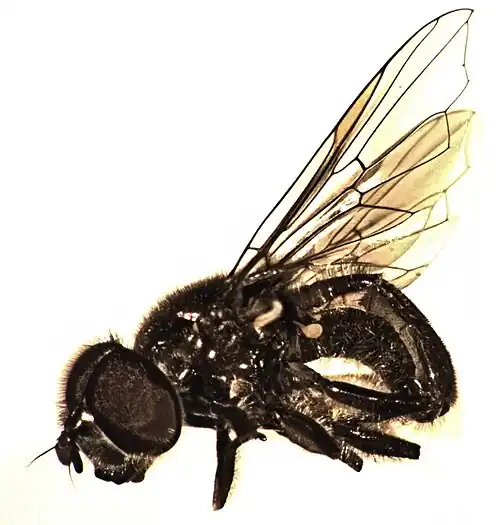Psilota decessa
Taxonavigation

| Taxonavigation: Syrphoidea |
|---|
|
Superregnum: Eukaryota |
Familia: Syrphidae
Subfamilia: Eristalinae
Tribus: Merodontini
Genus: Psilota
Species:
Name
- Psilota decessa (Hutton, 1901)
Note: Etymology: Under ICZN Art. 31.2.2, it may be argued that the epithet "decessum" could be treated as an invariant noun by default, as it can be either a noun or a participle, see Wiktionary, and furthermore Hutton did not explicitly state anything decisive on the intention of his original name formation. However, such interpretation requires the acceptance of a noun in the accusative case to be permissible, while in contrast ICZN 11.9 states that a "Latin or latinized word must be, or be treated as" then 11.9.1.1 "an adjective or participle in the nominative singular" (or the genitive case). ICZN 11.9.2 further states if such a word is written otherwise "it is to be corrected to the nominative singular if necessary."
Type locality: New Zealand (Either from "Christchurch (Clark)" or "Ashburton (W.W. Smith)").
Typus:
Synonyms
- Melanostoma decessum Hutton, 1901: 43. Protonym (Note: Same new combination was also mentioned previously on p.36)
- Lepidomyia decessum (Hutton, 1901); Miller, 1921 294
- Psilota decessa (Hutton, 1901); in Derraik & Heath 2005: 984; Kassebeer, Maibach & Rotheray 1998: [Not seen]; Thompson 2008: 16 (plus p. 3 key), contra below.
- Psilota decessum (Hutton, 1901); in Thompson 2008: 2 (plus figs.16, 19 and legends); Young, Skevington & van Steenis 2020: 4, Table 3.
References
Primary references
- Hutton, F.W. 1901. Synopsis of the Diptera Brachycera of New Zealand. Transactions and Proceedings of the New Zealand Institute 33: 1–95. BHL Reference page.
Additional references
- Derraik, J.G.B. & Heath, A.C.G. 2005. Immature Diptera (excluding Culicidae) inhabiting phytotelmata in the Auckland and Wellington regions.] New Zealand Journal of Marine and Freshwater Research, 39(4): 981–987 DOI: 10.1080/00288330.2005.9517368 PDF Reference page.
- Kassebeer, C., Maibach, A. & Rotheray, G.E. 1998. The third (final) stage larva of Psilota anthracina Meigen and Psilota decessa (Hutton) (Dipt., Syrphidae). The Entomologist's Monthly Magazine 134: 39–43.
- Miller, D. 1921. Material for a monograph on the Diptera fauna of New Zealand. Part II, Family Syrphidae. Transactions and proceedings of the New Zealand Institute 53: 289–333, plates XLVII-LII. BHL Reference page.
- Thompson, F.C. 2008. A conspectus of New Zealand flower flies (Diptera: Syrphidae) with the description of a new genus and species. Zootaxa 1716(1): 1–20. DOI: 10.11646/zootaxa.1716.1.1
 hdl: 10088/9708
hdl: 10088/9708  PDF. Reference page.
PDF. Reference page. - Young, A.D., Skevington, J.H. & van Steenis, W. 2020. Revision of the Psilota Meigen, 1822 flower flies (Diptera: Syrphidae) of Australia. Zootaxa 4737(1): 1–136. DOI: 10.11646/zootaxa.4737.1.1
 ResearchGate Reference page.
ResearchGate Reference page.